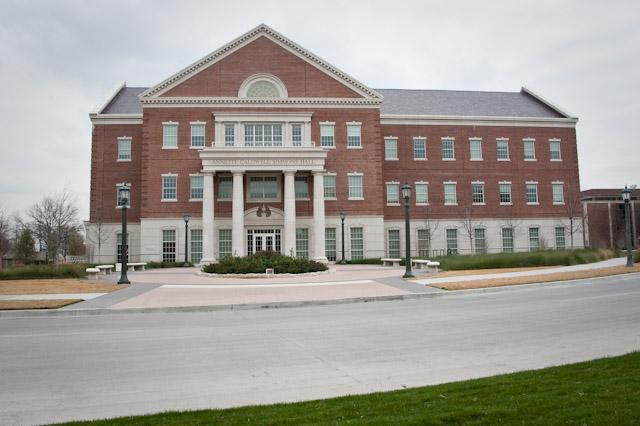
The Annette Caldwell Simmons School of Education was just named LEED Certified Gold. This award deals with the school’s low environment impact. (Sidney Hollingsworth/The Daily Campus)
Annette Caldwell Simmons School of Education and Human Development recently attained Leadership in Energy and Environmental Design (LEED) Gold Certification, a descriptive measure to promote a building as a whole approach to sustainability.
Through an extensive five-step process of registration, application, submittal, review, and certification, Simmons is now the newest LEED building on campus. LEED buildings stress sustainable sites, water efficiency, energy and atmosphere, materials and resources and indoor environmental quality.
The review process is spilt into three steps. First is the initial review where the review board makes comments on the designs. The team then takes the comments and resubmits the design with more clarification. Then the board rewards points. If points are denied, the team can reevaluate strategies to attain more points.
“The separate reviews help streamline the process and allow the design team to make adjustments to the building if certain strategies aren’t working or need to be revised,” Simmons’ Senior Project Manager Trisha Mehis said.
A LEED building, during the review process, has a possibility of attaining 110 points. Simmons attained 62 points, resulting in Gold certification, which is the second best certification. The levels are certified, silver, gold and platinum. It is SMU’s policy for a LEED building to be at least a Silver certification.
Now that Simmons is registered with the LEED Existing Building and Operations Maintenance, SMU must report energy usage and water consumption for Simmons to keep LEED guidelines.
This achievement was a collaborative effort between SMU, the General Contractor Rogers-O’Brien Construction, HHS Architects and the design team. Simmons is now the third building on the Dallas campus to attain a LEED Gold Certification. The others two are Embrey Hall and Caruth Hall.
The building design will be added to a database so other buildings can replicate the design practices. SMU has continually been making strides toward being more “green” and Simmons’ certification is one step of many to help this effort.
“There is an increasing awareness of being sustainable and SMU will be committed to using Simmons as a way to educate current and future students, faculty and staff,” Mehis said.








